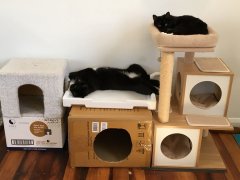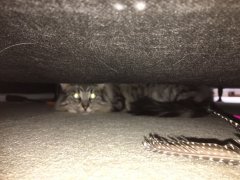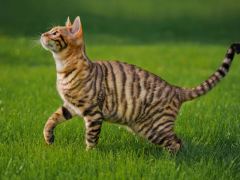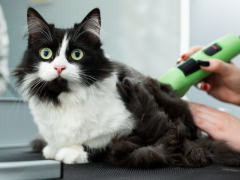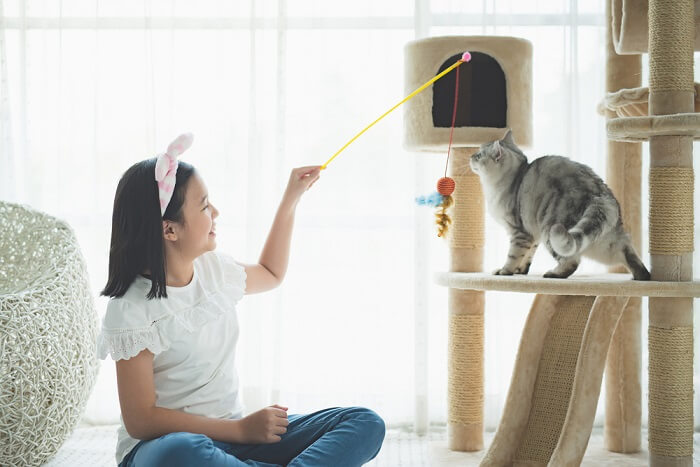
Nils Jacobi / Shutterstock.com
If you have ever been startled while sleeping by the sound of your cat’s night-time antics, you are certainly not alone. Cats are known for their nocturnal activities, often leading their owners to wonder why some cats stay up all night. Understanding the reasons behind your cat’s nocturnal antics can not only help you sleep better but also ensure your cat’s needs are met.
Cats are predatory crepuscular animals, which means they are naturally more active during dawn and dusk when their prey is more available. Night-time is when cats are most attuned to their hunting instincts, All their refined senses are heightened, even if they’re not hunting.
Cats may stay up all night if they have not had enough mental and physical stimulation during the day.Key Takeaways
10 Reasons Why Cats Stay Up All Night

There are a lot of reasons why your cat may be sleeping more in the daytime than the night. Pogodina Natalia / Shutterstock.com
Cats sleep a lot – but there are a variety of reasons why your cat may be up at unsociable hours. From hunting to boredom, hunger to health concerns, understanding why your cat may be awake is an important step to ensuring the whole household gets the rest you need.
1. Natural Instincts
One of the primary reasons cats stay up all night is their innate instincts. Cats are crepuscular creatures, meaning they are most active during the early morning and late evening. This behavior is a survival trait inherited from their wild ancestors, who found dawn and dusk to be the best times for hunting their chosen prey, which is also most active during these times.
2. Hunting Behavior
Even though your indoor cat may be well-fed and doesn’t need to hunt for food, its instinct to do so is still very much alive. The shift from day to night during dusk often triggers these instinctual hunting traits, leading to frenetic bursts of energy when the house is otherwise quiet.
Your cat might be “hunting” toys, shadows, or even imaginary prey, keeping them active and alert during the night. This is a hard-wired behavioral trait to keep their body lithe and poised ready for any prey that would be unfortunate to come their way.
3. Boredom or Lack of Stimulation
Cats that don’t get enough mental or physical stimulation during the day may resort to night-time activities to burn off their excess energy. Without engaging in activities like interactive play sessions with their caregivers, engaging in puzzles and forage feeders, or climbing opportunities, your cat might find it difficult to wind down at night, leading to late-night ‘zoomies’ and imaginary hunting play activities.
4. Nocturnal Curiosity
Cats are naturally curious, active animals and night-time can present a new world of stimuli. They might hear the faintest sound from outside, see shadows moving, or notice small insects that only come out at night.
A cat’s auditory senses are so well-honed that they can even hear the tiny footsteps of a mouse! These new stimuli can kindle your cat’s interest, keeping it alert and active.
5. Hunger or Thirst
If your cat is hungry or thirsty, they might wake up and start moving around in search of food or water. This is especially common in cats fed on a low-protein diet, with an inconsistent schedule, or in homes where food and water bowls are inaccessible. Providing a snuffle mat loaded as a late-night snack, placing hide-and-seek feeders around the house for ‘quiet nocturnal hunting’, and ensuring water is always available can help mitigate this issue.
6. Territorial Behavior
Cats are territorial animals, and an indoor cat at night-time may be triggered to feel the need to patrol its territory—’ your home.’ It might be checking for any changes in its environment, ensuring everything is as it should be. Cats thrive on predictable and routine behavior in their territory. This behavior is a natural extension of their instinct to protect their zone from threats.
7. Loneliness or Separation Anxiety
Cats are often considered aloof or independent creatures, but they can experience loneliness and separation anxiety, particularly if left alone for a considerable amount of time during the day. When you go to bed, consider that your cat might feel isolated, thus prompting them to engage in attention-seeking rituals by knocking objects off your nightstand in the hope of a reaction, good or bad.
It is still getting the attention they sought, and thus, a pattern of behavior is learned. They may engage in harmful or destructive activities to cope with their loneliness.
8. Health Issues
Sometimes, a cat’s night-time activity could be a sign of underlying health issues. Conditions like hyperthyroidism, arthritis, or cognitive dysfunction can cause restlessness, making it difficult for cats to sleep through the night. Behavioral problems and disease can co-exist, so it is crucial that if your cat’s night-time behavior suddenly changes or is accompanied by other symptoms, a visit to the veterinarian is recommended.
9. Age-Related Changes
As cats age, their sleep patterns can change. Geriatric cats may sleep more during the day and become more restless at night. This can be due to a variety of factors, including discomfort from arthritis, cognitive decline (feline cognitive dysfunction), or simply a change in their circadian rhythm.
Providing a warm, comfortable sleeping area and addressing any health concerns by taking your cat to the vet can help your senior cat rest more easily at night.
10. Environmental Factors
Finally, your cat’s environment plays a significant role in their night-time behavior. If your home is too noisy, too quiet, too bright, or too cold, it can affect your cat’s ability to sleep through the night. Ensuring that your cat has a comfortable, safe, and quiet place to sleep can help reduce nighttime activity. If you are cold, your cat will likely be cold, too.
How To Help Your Cat Sleep at Night

Puzzle feeders, toys and interactive games can all provide essential mental and physical stimulation for cats. Veera / Shutterstock.com
Understanding why your cat stays up all night is key to helping them (and you) get a better night’s sleep. By addressing their welfare needs and instincts, providing ample stimulation, and ensuring their environment is conducive to rest, you can help your cat settle down and enjoy a peaceful night’s sleep.
If your cat’s nighttime activities are causing disruptions, there are several strategies you can implement to help them (and you) get a better night’s sleep:
- Increase Daytime Activity: Engage your cat in regular play sessions during the day to help burn off excess energy. In a multi-cat home, make sure to allow for solo play interaction. Use toys that mimic prey to stimulate their hunting instincts. Ideally, offer play before food to imitate the hunting sequence.
- Provide Enrichment: Ensure your cat has plenty of mental and physical stimulation throughout the day. Puzzle feeders, foraging mats, tall, robust cat trees, and interactive toys can keep your cat engaged. Cat TV can also help capture their attention for short spans throughout the day.
- Set a Routine: Cats thrive on routine. Try to feed and play with your cat at the same times each day, particularly during the trigger times of dusk and dawn and especially before bedtime, to help them wind down.
- Comfortable Sleep Environment: Ensure your cat has a cozy, quiet place to sleep away from distractions. A warm, elevated retreat in a quiet area of the home can do wonders for helping your cat settle down. For senior cats, consider a heated pad, a night light, and a radio playing softly in the background to provide security.
- Consult Your Veterinarian: If your cat’s nighttime activity is new or has suddenly increased, it could be anything that’s out of the norm for your cat—hiding, inappetence, or increased vocalization, to name a few. It’s important to rule out any underlying health issues.
Frequently Asked Questions
Why is my cat more active at night than during the day?
Cats are naturally crepuscular, meaning they are more active during dawn and dusk. This behavior is instinctual and linked to their wild ancestors who hunted during these times.
Can I change my cat’s sleep schedule?
Yes, with consistent routines and increased daytime activity, you can help your cat adjust to a more sleep-friendly schedule.
Is it normal for a cat to meow at night?
It can be normal, but excessive nighttime meowing could indicate hunger, boredom, or a health issue. It’s important to observe the context and consult with a veterinarian if needed.
Why does my cat wake me up at night?
Your cat might wake you up if they are hungry, bored, or seeking attention. Addressing these needs during the day can help reduce nighttime disturbances. Be careful not to reinforce attention-seeking behaviors that will lead to learned behavior.
Should I feed my cat before bed?
A small meal with high protein before bed can help your cat feel satisfied and may reduce nighttime activity. However, avoid feeding too close to bedtime to prevent digestive issues. Light snacks in a snuffle mat or hidden treats around the home can provide satiety until the morning.


